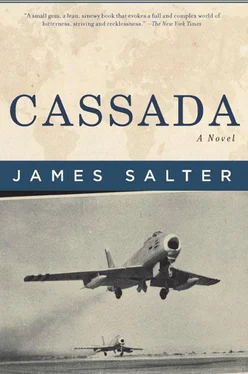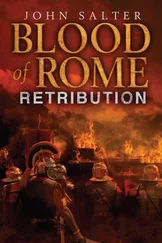To the officers and men and Norm Phillips
This novel about flying is drawn from another, earlier one, The Arm of Flesh, published in 1961 and largely a failure. It lay forgotten for a long time until Jack Shoemaker, the editor-in-chief of Counterpoint, suggested that it might be a companion piece to another book he had republished, The Hunters, which was my first novel.
I had revised The Hunters slightly for its second appearance. The Arm of Flesh, however, had serious faults and needed to be rewritten completely. Even the title deserved to be changed to, in this case, one of the principal characters. It may have been a mistake to try to stand on its feet again a failed book, but there were elements in it that continued to be interesting, among them the fact that it was sometimes the best along with the worst pilots who got killed for reasons the reader may come to understand, and that the group’s acceptance of certain, sometimes very promising individuals is not always foregone or easy.
Beyond these things was the appeal of the period, the 1950s, barely a decade after the war; the place, the fighter bases of Europe; and the life itself. This new version, then, is meant to be the book the other might have been.
July 2000
Towards the end of the afternoon Dunning sat in the office, going through papers, from time to time licking a thumb as he turned a page. His broad brow was furrowed as he read, but he was an image of calm, like a judge examining briefs. Outside, the sky was dark, the clouds threatening rain. It had been that way since morning. From time to time in the stillness came the call of crows on the fenceposts or in bare branches at the edge of the field. Saturday late. Almost everyone gone.
A low sound, barely audible at first, made him turn his head. For a moment he seemed almost puzzled. The sound was faint but growing and unmistakable, like distant thunder. It was engines, wide open. They were as if headed towards him. He could hear them, full and unwavering, suddenly very close, almost overhead, roaring down the runway, low, but in the clouds. He never saw them. Then they had passed, but the sound stayed there, heavy and prophetic, before slowly fading, leaving silence behind. Dunning reached for the telephone, German like much of it, and dialed a number. Waiting for someone to answer he turned to the window again. It was absolutely quiet, the crows settled back in the trees. Impatiently he opened the thin directory to check the number when a voice said at last, “Base weather.”
“Give me the forecaster,” Dunning ordered.
“He’s not here, suh.”
“Where is he?”
“I doan know. He may be downstairs having coffee.”
“Go and get him for me right away.”
“Well, I don’t know where he’s at right now. Can I have him to call you?”
“No, goddamn it! Go get him! Go find him!”
“I’m not allowed to leave the weather station,” the voice complained, almost sulkily.
“I don’t give a damn what you’re allowed to do. This is Major Dunning. Start finding him in a hurry!”
There was no reply, only faint breathing over the phone.
“Did you understand me?” Dunning said.
“Yes, suh.”
“Then get me the forecaster!”
After a moment or two there was the sound of the phone laid down. Dunning tried to estimate the ceiling himself. He could just make out the control tower a mile away, the beacon on top of it turning steadily, vacant and pale, like the gaze of a blind man. There were dark, smokey patches of cloud near it floating nearly that low. He pushed the window open to hear better. Silence, even greater than it seemed before. Someone picked up the phone. The clearing of a throat.
“Forecaster speaking.”
“Who is this?” Dunning demanded.
“Sergeant McEnerny, sir.”
“Where the hell have you been? Aren’t you supposed to be on duty?”
“Yes, sir,” the sergeant said, “I am. I’ve been right here in the building all along.”
“I’ll find out where you’ve been, don’t worry about that. What are you reporting the weather as? Someone just made a missed approach here.”
“This is Major Dunning, sir?”
“That’s right.”
“I see, sir,” the sergeant said. “Our latest observation is five hundred overcast,” he was reading from a sheet of yellow paper, “and a mile and a half in light fog.”
“When did you make that? Take a look out the window.”
“The observation was made on the hour. That’s exactly…” A pause. “Eighteen minutes ago.”
“What does Spangdahlem have?” Dunning said. He could hear the movement on the other end, a clipboard being reached for.
“Let’s see. They’re calling it a little lower, Major. They’re calling it three hundred broken.”
“I thought so.”
“Three hundred broken, five hundred overcast, one mile in fog.”
“That sounds more like it.”
“Well, sir, here we have five hundred and a mile and a half. That’s current.”
“Make another observation, sergeant,” Dunning said, “and call me back. That’s an order.”
He was interrupted by the sound of footsteps. Someone was running down the hall. A head appeared in the doorway. Godchaux, one of the champions.
“Major?” There was something in his voice.
“What is it?” Dunning said, now quite alert.
“That was two of ours.”
Dunning was the squadron commander, an exalted position. He was at the last command level of complete intimacy with all those beneath him, thirty-odd pilots and a hundred and forty men, some veterans, others serving in their unforgettable first unit, many he would have been able to call by their first name but he liked to use rank, roll it off his tongue, Sergeant somebody, Lieutenant. His mouth would purse oddly. He was a southerner; a strain of formality was in his blood.
He was well-known in the wing and even beyond. He was six years in grade, his wife, Mayann, a past president of the Officers’ Wives Club. A command-wide list, confidential, requested by the Pentagon, had gone in from Twelfth Air Force. On it were the first twenty officers of the rank of major recommended regardless of seniority for promotion to lieutenant colonel. Davis R. Dunning, commander 44th Fighter Squadron, had been the first name. What had become of the list, what action would be taken, no one yet knew.
Isbell was his operations officer and right arm. A captain, he was a different sort, cool on the outside, cooler within with but one flaw: he was an idealist. Apart from that he had almost every thing necessary. He was experienced, confident, untiring. He had seven hundred hours in the airplane and two thousand besides, a hundred and sixty of them flying against the Russians and Chinese in Korea, fierce fights along the Yalu. In addition to other knowledge, he knew Dunning. They had been together for more than two years. They were, with the first sergeant, Banda, an ex-marine, triumvirs. All that was to be done or not to be done flowed from them.
Giebelstadt. It was entirely characteristic of Isbell to rise before daylight to check the alert flight. Early fall. The summer had been short, about one week instead of the usual two, as Dunning remarked. There was early frost turning the grass silver and flecking the airplane canopies with white. The cool smell of snow was already in the air together with the crowing of a distant rooster. Isbell walked down to the latrine in the darkness. The water was loud when he turned it on. He warmed his hands beneath it for a while. Cold was coming through the casement windows.
Читать дальше













